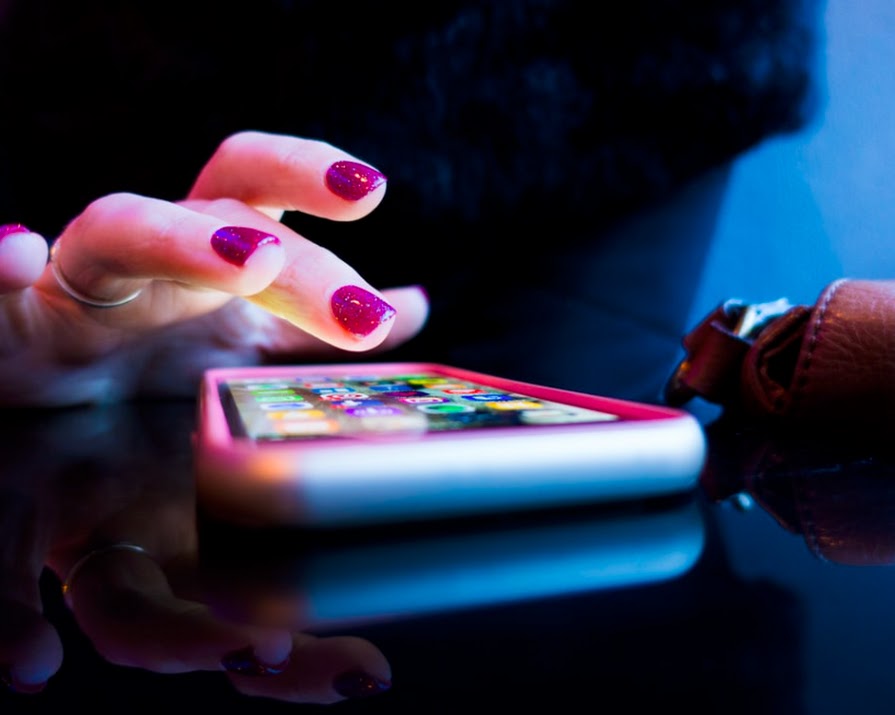
By Amanda Cassidy
10th Nov 2021
10th Nov 2021
We joke about it and vow to disconnect more often, but new research has found that not only are we addicted to our phones, but social media is also incredibly detrimental to our mental and physical health. So is it officially time to break up with our phones?
A recent barrage of Facebook leaks revealed that Facebook’s own studies found that up to 32% of teenage girls who felt bad about their bodies felt that going on Instagram made it worse, while 14% of boys felt Instagram made them feel worse about themselves. Among British teenagers with suicidal thoughts, some traced their negative feelings back to Instagram.
Not only are the apps proven to be damaging to young minds, but platforms like Instagram have been found to be directing users towards harmful content.
And yet, as teenagers and adults know, we just can’t stop going on our phones. One in four children is “addicted” to their smartphones — a shocking revelation from research carried out at King’s College London.
After examining 41 studies published since 2011 on smartphone usage and mental health, the authors conclude that between 10 per cent and 30 per cent of children and young people use their phones in a dysfunctional way, meaning that on average 23 per cent were showing ‘problematic smartphone usage’. It’s even been given the title, PSU.
Dr Kalk from the Institute of Psychology and Neuroscience explained that they still have a lot to learn. “Smartphones are here to stay and there is a need to understand the prevalence of problematic smartphone usage. We don’t know whether it is the smartphone itself that can be addictive or the apps that people use.
“Nevertheless, there is a need for public awareness around smartphone use in children and young people, and parents should be aware of how much time their children spend on their phones.”
There is really nothing that surprising about this information. How can we expect young people to moderate how they use online resources when so many of us can barely keep our noses out of our own pocket-internet?
Self-esteem
A psychologist friend of mine was asked recently when she recommended giving a child a smartphone. She answered “when you are happy for them to view hardcore pornography”.
Besides the dramatic aspects of unfettered internet so widely accessible to children without the mental capacity to deal with it, spending so much time online can add to anxiety, depression, self-esteem issues as well as the dangers that come from cyberbullying, being left out, trolled.
And it isn’t just children.
Do you feel anxious when you are separated from your phone? Research by the PEW Centre found that 67 per cent of us have admitted checking our phones for calls or messages when our phone didn’t beep or ring. This alone is one of the signs of smartphone dependence.
To be clear, smartphone addiction is not yet listed on the globally recognised Diagnostic and Statistical Manual of Mental Disorders, but research has compared it to gambling addiction with the reward signal in our brains being activated.
Some of the signs include needing to use your phone more often to achieve the same desired effect, failed attempts to use the phone less often, preoccupation with using it, putting a relationship or job at risk due to excessive cell phone use and a withdrawal/frustration when network is unreachable.
Imagination
A red flag for all of us should be the fact that many Silicon Valley parents are choosing to raise their children away from the online world. In 2017, a survey found that out of over 900 Silicon Valley parents, most had concerns about the impact of tech on their children’s psychological and social development.
Speaking to Business Insider, chief AI engineer Taewoo Kim pointed out why. “You can’t put your face in a device and expect to develop a long-term attention span. The tech companies do know that the sooner you get kids, adolescents, or teenagers used to your platform, the easier it is to become a lifelong habit.”
Instead, many are teaching their children to appreciate screen-free games and interpersonal connections. Among those who have limited how much tech their kids consume are Apple co-founder Steve Jobs, Microsoft co-founder Bill Gates, tech billionaire Mark Cuban and Reddit co-founder Alexis Ohanian.
Speaking to CNBC in 2018, Ohanian explained why: “My wife and I both want her to be bored. My wife and I both want her to know what it’s like to have limits on tech… I do look forward to playing video games with her when she’s older, but it’s really important that she gets time to just be with her thoughts and be with her blocks and be with her toys, so we’ll be regulating it pretty heavily.”
Along the way, the age of adulthood on the internet has dramatically shrunk. Yet, at 13, children are still ten years off having a fully developed prefrontal cortex, the part of the brain involved in decision-making and impulse control. They are still developing their sense of self, all this on a diet of YouTube and Instagram.
We are all guilty of being the Pavlov dog to that tiny ping that means you are being summoned by your phone
Technology has provided a convenience, ease, connection and entertainment aspect to our lives, about that there is no doubt, but people are now increasingly realising the benefits of unplugging.
Off-grid
A study from the University of Maryland discovered that students who unplugged from technology reported improved quality of life, meaning they spent more time with family and friends, got more exercise and even ate healthier. Less time looking at a screen gave them actual free time to spend elsewhere.
It can sneak up on all of us.
We all know that rabbit hole we can fall down, the jolt when you realise how much time you’ve just spent online without even registering it. A new app can now show you how much screen time used each day and the results are quite horrifying. Life is happening all around us.
A punishment screen ban in our house recently (for the children!) resulted in really rich imaginative play. As a mother, I can see that the problems that come from screen time is less about the screen itself or the content, and more about the time they could be spending playing or interacting with real-life; building relationships, learning from one another, talking, imagining, daydreaming.
We are all guilty of being the Pavlov dog to that tiny ping that means you are being summoned by your phone. We’ve become a slave to it without realising it.
Unplugging even in small bursts is worth thinking about. The Nokia Blockia phones that provide connection without the internet are on the rise as more of us choose to go back to basics.
But handing a child the internet just because everyone else in their class has it, is unwise at best and at worst, could even be described as irresponsible parenting.























